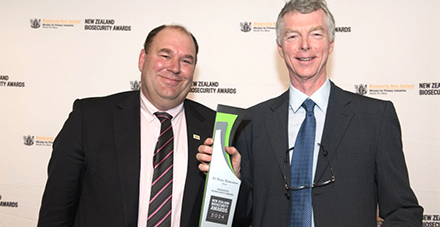
New Zealand Biosecurity Minister Andrew Hoggard with the Minister’s Biosecurity Award winner Dr Brian Richardson
Spanning four decades and featuring domestic and internationally significant work, Dr Brian Richardson’s career was acknowledged when Biosecurity Minister Andrew Hoggard presented him with the Minister’s Biosecurity Award at the New Zealand Biosecurity Awards dinner at the Beehive. Source: Timberbiz
The award recognises outstanding contributions to New Zealand biosecurity over at least 10 years.
Dr Richardson, a principal scientist in Scion’s Plant Protection Physics and Chemistry team, has worked at Scion since 1983 and research during his 41-year career has focused on forest protection, particularly in the areas of biosecurity and pest management.
His expertise in pesticide application has been applied to pest eradication operations and more recently to the problem of wilding conifers, where his aerial spraying guidelines now underpin the Wilding Conifer Control Program.
Dr Richardson also helped eradicate invasive insects including the painted apple moth, white-spotted tussock moth, and southern saltmarsh mosquito. Successful invasions of these pests could have crippled New Zealand’s horticulture and forestry exports.
What keeps many people in science, Dr Richardson says, is a sense of curiosity.
“That sense of discovery is really exciting, but for me, it’s adding value. Seeing something you do of use to someone. That motivates me. Working with teams has always been a big part of it too,” he said.
“Anything I’ve achieved has been with the support and partnership of others who I feel all share in this award. Sadly, some of those who helped me on my career journey are no longer with us, but I will still acknowledge their contributions.”
He also remembers some challenging and successful projects that became career highlights.
“I think some have shared common characteristics. They’ve been complex problems with clear goals or challenges for the science to overcome. They’ve involved partnerships between policymakers, the science teams and people managing operations. We’ve worked closely together as a team and that’s really key to success,” he said.
“There’s a lot of satisfaction in science that is immediately of value and can be used by people making decisions.”
Dr Richardson has also collaborated internationally, such as with the US Forest Service on the development of spray modelling systems to quantify pesticide drift and efficacy. This work was recognised with a technology transfer award from the USDA Forest Service in 1996.
He has contributed to technical advisory groups convened to address significant biosecurity incursions such as the brown marmorated stink bug and been involved in sector-wide initiatives like the Forest Biosecurity Council and as a board member on research programmes, including Better Border Biosecurity, BioProtection Research Centre, and Frontline Biosecurity.
Scion chief executive Dr Julian Elder says it is great to see a lifetime’s achievements be recognised.
“As Brian said in his acceptance speech it is a huge reflection on all the people he has worked with over the years. It is also great to see Scion and the critical work the Crown Research Institutes do for New Zealand being acknowledged.”
Forest Owners Association chief executive Dr Elizabeth Heeg says Richardson’s recognition is well deserved.
“It’s really important for scientists in the forest industry to be recognised. Scientists generally, and those who work in the forest industry in particular, tend to be overlooked when awards are handed out.”
“So, recognition through a Ministerial Award is tremendous news.”
“That Brian’s work is in biosecurity is also noteworthy. Keeping pests and pathogens out of our production forests, native trees and gardens is vital, but usually the more successful we are the less newsworthy it is.”
The award is the latest in a list of Dr Richardson’s achievements including the NZ Institute of Forestry ‘Forester of the Year’ Award in 2015, a Science New Zealand Lifetime Achievement Award in 2019 and New Zealand Plant Protection Medal in 2022.





